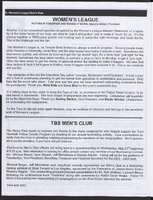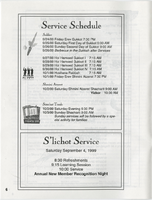Search the Special Collections and Archives Portal
Search Results

Transcript of interview with Robert D. "Bob" Fisher by Barbara Tabach, January 8, 2015
Date
Archival Collection
Description
Robert D. "Bob" Fisher is a Las Vegas, Nevada broadcast personality and lobbyist. He was born in Minneapolis, Minnesota and moved to Las Vegas in 1994 when he was hired to be the founding president and CEO of the Nevada Broadcasters Association (NVBA). During his 22 years as head of the NVBA, he produced and hosted Observations, a public affairs program broadcasted on radio and television throughout the state of Nevada. Soon after, he began producing and hosting the only weekly live television program about diabetes in the United States; in 2015 his weekly live radio program The Diabetes Show was the only one of its kind to be aired over commercial radio in the U.S. Fisher helped bring the AMBER Alert program to Nevada in 2003, and served as its chairman and coordinator for ten years. His other lobbying successes include the classification of certified broadcasters as First Responders and the elimination of Broadcaster Non-Compete contracts in 2013. He served on the Nevada Homeland Security Commission for 13 years, the Nevada Crime Commission, and the Governor's Defense Base Closure and Realignment Commission. Fisher is a founding clergy member of Midbar Kodesh Temple in Henderson, Nevada and served as its cantor for over a decade. After his retirement from NVBA at the end of 2014, he established Bob Fisher Weddings to provide his services as a wedding officiant. In this interview, conducted shortly after his retirement from NVBA, Fisher discusses his childhood in Twin Cities, and the large role Judaism played in his upbringing. He speaks at length about his involvement with United Synagogue of Conservative Judaism over the years, including as regional director of the United Synagogue Youth Far West Region, which took him from Minnesota to California. He talks about his time in Los Angeles, and later, about his life in Las Vegas, including his broadcasting career as well as involvement with Midbar Kodesh Temple.
Text
Rabbi Sanford Akselrad oral history interview
Identifier
Abstract
Oral history interview with Rabbi Sanford Akselrad conducted by Barbara Tabach on March 7, 2018 for the Remembering 1 October Oral History Project. In this interview, Rabbi Sanford Akselrad discusses the response of the Jewish community of Congregation Ner Tamid to the October 2017 mass shooting in Las Vegas, Nevada. He discusses the healing service he led the day after the shooting, how the community paid respect to the victims, and the concert held to raise money. In addition to the actions of the Jewish community, Rabbi Akselrad discusses the congregation's work with the interfaith community to heal from this tragedy.
Archival Collection

Jessica Hutchings oral history interview: transcript
Date
Archival Collection
Description
Oral history interview with Jessica Hutchings conducted by Barbara Tabach on March 21, 2018 for the Remembering 1 October Oral History Project. In this interview, Jessica Hutchings discusses her experience flying to Las Vegas, Nevada on the night of the October 1, 2017 mass shooting. She speaks of her flight's detour to Phoenix, Arizona, and her discovery of the shooting. Hutchings explains how Congregation Ner Tamid, where she is a cantor, contributed to the community healing after the tragedy, including their organization of vigils, a music fundraiser called "Vegas Strong in Song," and discussing the event with teenage Hebrew School students who had questions and concerns about the shooting.
Text

Pamphlet from the 8th annual Jewish Family Service Agency Tsedakah event, 2015
Date
Archival Collection
Description
This pamphlet contains statistics about Jewish Family Service Agency services provided to the community, and sponsorship advertisements from local businesses.
Text

Long Range Planning Study for Temple Beth Sholom, July 1988
Date
Archival Collection
Description
This report provides the results of a study conducted by CITYWEST, Inc., to "determine whether the synagogue should remain in its current location and be renovated, remain in its current location and rebuild, or move." The report addresses leadership and staff development, as well as programming recommendations.
Text

Transcript of interview with Andrew and Debbie Levy by Barbara Tabach, September 12, 2016
Date
Archival Collection
Description
Andrew (Drew) Levy was born and raised in Las Vegas, Nevada, where his family became prominent civic and real estate leaders. His grandfather was Harry Levy, a former Las Vegas City Commissioner, and his father Alvin Levy was a former councilman. Drew is always proud to say that he never left Las Vegas and of partnering with his father in the Levy Realty Company. While growing up, Drew it was easy for a teenager to enjoy the perks that could accompany his family?s civic persona?such as casino shows, events and meeting early Las Vegas casino executives like Moe Dalitz. After graduation from Clark High School, Drew attended Arizona State University. It was in Tempe that he met Debbie Cheek, his future wife. When Debbie arrived in Las Vegas, she enrolled at the University of Nevada, Las Vegas, where she finished her degree and started her accounting practice. She ran her business for ten years before opening Art Starts Here, an art school. In the 1990s, Debbie?s passion for art led her to be involved in the creation of First Friday, a local monthly art festival. She also teaches a summer art camp for the Adelson Educational Campus. Drew and Debbie became deeply involved in the many Jewish congregations in Las Vegas. Blossoming first at Temple Beth Sholom where they were married in 1980, Debbie sat on the preschool board and oversaw the temple board, while Drew was the advisor for the youth group. The couple later joined Congregation Ner Tamid where Drew was congregation president from 1999 to 2000 and Debbie was board treasurer in 2001. Debbie includes stories of her conversion to Judaism and keeping kosher. In this interview, Drew and Debbie Levy reflect on changes they see in Las Vegas, from when Drew was a kid to the times they raised their own daughters, Sarah and Jenna, here. Looking at the larger picture of the city, they describe booms in the real estate market and growth in the artistic and cultural aspects of Las Vegas. They provide a perspective of the growth of the local Jewish community.
Text




